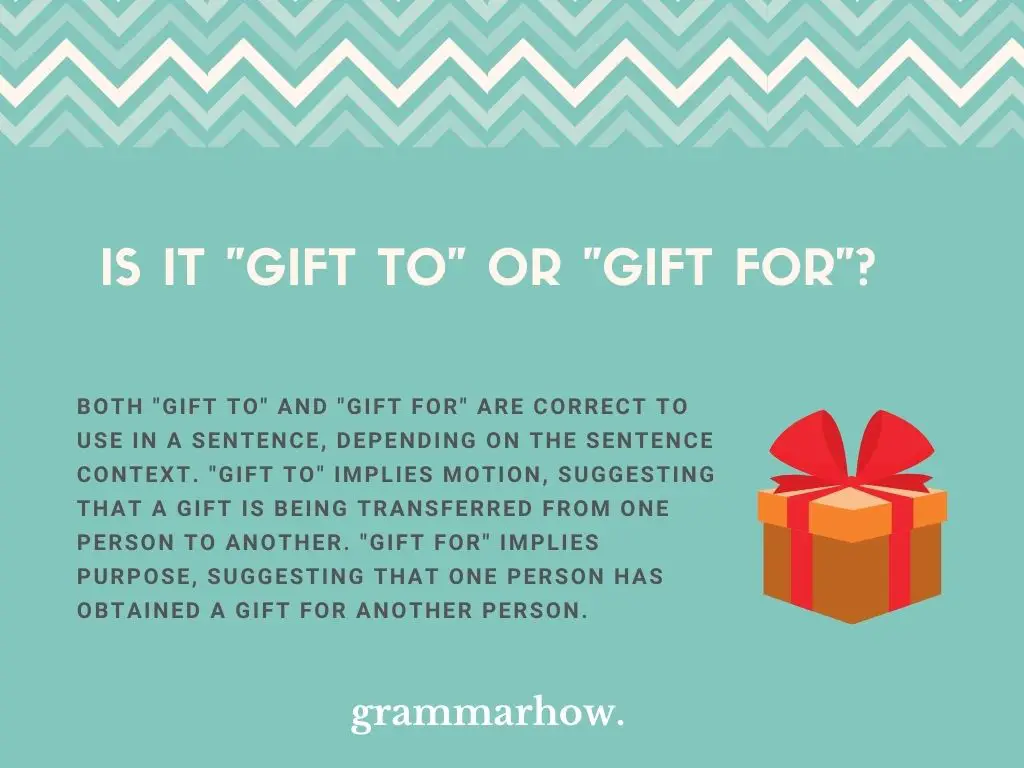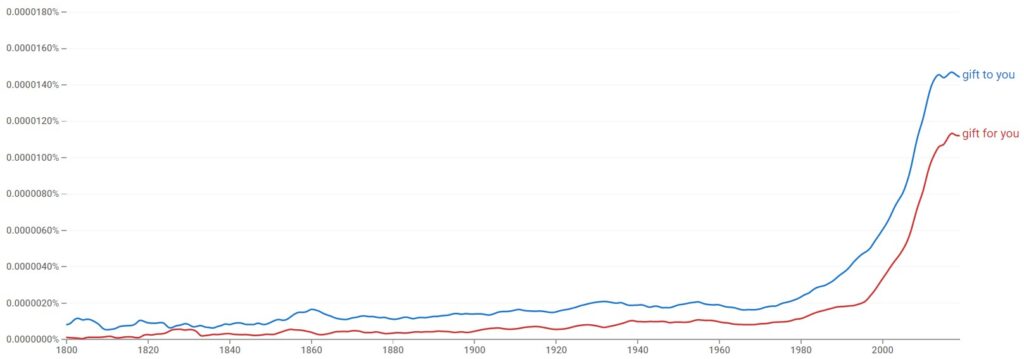The difference between the phrases “gift to” and “gift for” can be a confusing concept to understand for even the most advanced readers and writers. This helpful article will elevate your understanding by using examples to explain the difference between “gift to” and “gift for”.
Is It “Gift To” Or “Gift For”?
Both “gift to” and “gift for” are correct to use in a sentence, depending on the sentence context. “Gift to” implies motion, suggesting that a gift is being transferred from one person to another. “Gift for” implies purpose, suggesting that one person has obtained a gift for another person.

For example, when using “gift to”:
“I have transferred a financial gift to your bank account”.
And when using “gift for”:
“I have bought a birthday gift for you”.
Indeed, the phrase “gift to” suggests that a gift is in the process of being transferred, or has already been transferred from one person or party to another.
On the other hand, the phrase “gift for” implies that a gift is intended for a particular person to party, but the gift may have or may not have already been given.
What Does “Gift To” Mean?
The phrase “gift to” suggests that a gift is being, or was previously, transferred from one person or party to another. The phrase “gift to” implies that motion is taking place.
The phrase “gift to” is often used in circumstances when someone is no longer alive. For example, a “gift” can be left to someone in a will as a form of inheritance.
Ways to use the phrase “gift to” in sentences can be somewhat confusing. Check out the following examples of sentences including the phrase “gift to”:
- I have left a special gift to you in my will; I think you will be pleased.
- It is only right that Mary leaves her fortune as a gift to you.
- I am keen to send a gift to you; can you advise me what to buy, please?
- My only gift to you is to say thank you for all of your help and support over the years.
- This gift to you was all he had left to give,
What Does “Gift For” Mean?
The phrase “gift for” means that one person or party has got a present or gift for another person or party. The phrase “gift for” implies a sense of purpose.
When this phrase is used in a sentence, both people or parties involved in the discussion are living.
To enhance your understanding of the phrase “gift for” consult the following helpful example sentences:
- I have ordered something special for you from your favorite store as a gift for your 50th birthday.
- I have wrapped a gift for you; would you like to open it now?
- I have a gift for you from Katie; she called in earlier to drop it off but you were sound asleep.
- I found this gift for you behind the sofa; I think it is from Mum and Dad, but I’m not completely sure because there is no gift tag.
- I got a pay rise this month so I bought the perfect gift for you from the most expensive store I could find.
Are “Gift To” And “Gift For” Interchangeable?
The phrase “gift to” and “gift for” are very similar, their levels of usage are fairly equal and in some cases, they are interchangeable in a sentence, but these two phrases are not always interchangeable.
When a gift is “to” a person, it is also “for” a person, so each phrase can work in this instance. However, one version of each phrase will always soon more natural than the other within the sentence.
Is “Gift To” Or “Gift For” Used The Most?
The phrase “gift to” is used more than the phrase “gift for”.
This graph from Google Ngram Viewer shows the usage of the phrases “gift to you” and “gift for you” in the period 1800 to 2019. The line in red depicts the usage of “gift for you” and the line in blue shows the usage of “gift to you”.

As you can observe, the graph clearly shows that the phrase “gift to you” is the phrase used the most out of the two phrases, although the usage of the two phrases is not too dissimilar.

Martin holds a Master’s degree in Finance and International Business. He has six years of experience in professional communication with clients, executives, and colleagues. Furthermore, he has teaching experience from Aarhus University. Martin has been featured as an expert in communication and teaching on Forbes and Shopify. Read more about Martin here.
